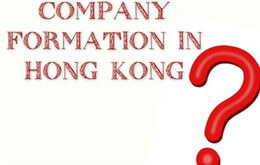The following Q&A helps us to get a deep understanding of the establishment and management of the
Hong Kong company.
1.Q: Is it feasible to register in Hong Kong but carry out business outside of Hong Kong? And if it is, how to operate?
A: The establishment of a company in Hong Kong may conduct normal legal operations outside of China; We can use the Hong Kong company to conduct sino-foreign trade, set up sino-foreign joint ventures (exclusive), open offshore accounts to collect foreign exchange, and set up domestic companies and so on.
2.Q: What materials and fees should we prepare? Is the registered capital required to be fully in place?
A: Please refer to the description of the establishment of HK company on our website to find the information you need to provide and the conditions that must be met. The registered capital (the capital verification) is required to be in place when setting up a Hong Kong company.
3.Q: What happens if you don't fund the Hong Kong company?
A: In order to attract clients to register Hong Kong company, a number of consulting companies' web pages headline that when registering company in Hong Kong, the funds don’t need to in place. Is it true? That limit company is the sense of the limited liability of the shareholders, and how is the limitation of the responsibilities of the shareholder? This depends on how much the shareholder subscribes after the company is registered or when the company is established. If shareholders subscribe to one million shares of one yuan each, shareholders will pay one million yuan for the company's responsibility. If the subscription shares are still not in place and the company fails, the Hong Kong companies registry will appoint a liquidator to collect the funds from the shareholders. The shareholders' liability is complete when the funds for the equity are received.
Sample 1:
The company registered capital of HK$ 10 million. The shareholder had subscribed ten million shares and injected all the funds into the company, and the shareholders' responsibility is completed. If the shareholder only invests 3 million yuan, if the company fails, the shareholder will pay 7 million yuan to the company.
Sample 2:
Company registered capital of HK$ 10 million. The shareholders take three million shares and inject three million into the firm, and the shareholder's responsibility is done. If the company fails, the shareholders have no responsibility.
From these examples, it's clear that the responsibility of the shareholders is to take a stake in the corporation, not to register capital.
4.Q: In addition to agency registration, what kind of follow-up services can you provide? How to charge?
A: In addition to registering agent company, we provide the following services: company year careful, arranging audit auditing, open a bank account, and commerce secretary, charge depending on the service content, it is best to contact the company with.

5.Q: When will the newly-established limited company be able to check the background records of the company to the registration department of the company?
A: Generally speaking, you can check the company's background record at the company registry after 16 working days. The information is stored in the form of the film to facilitate the public search. According to this situation, as long as it is a newly established company, we would like to open an account, and we'd better inform the relevant parties about 16 working days before we go to register. If the search company has been established for more than one month, the search results will be available in 3 days.
6.Q: What about the tax on Hong Kong companies?
A: The Hong Kong government is a free port with low taxes and low tax rates. The company must pay only one income tax per year, and the so-called income tax is calculated according to the company's income, which is pure profit. The tax rate is 16.5%. for example, the annual turnover of a company is 10 million, gross profit is 2 million and net profit is 1 million. The company should give the government an income tax of 100x16.5% = 165,000. If the company is not profitable, the company does not have to pay taxes.
7.Q: Is there a tax on products in and out of Hong Kong?
A: In addition to tobacco and alcohol, goods in and out of Hong Kong are not taxed. But customs clearance is required, with a cost of about 3‰.
8.Q: What tax should be paid when setting up a company?
A: To establish a Hong Kong company, a registered capital stamp duty must be paid. The registered capital stamp duty is levied according to 1/1000 of registered capital. For example, the registered capital is RMB 1 million, and stamp duty is 1000 yuan.
9.Q: What are the operational differences between Hong Kong and mainland offshore accounts?
A: Hong Kong accounts and offshore accounts (an offshore account refers to a bank where the depositor opens an account outside the country where it resides. In contrast, the banks in which the depositor resides are called onshore or onshore banks.
1.
Freedom of fund transfers.
An offshore account of a client is equivalent to an account opened by an offshore bank and can be freely transferred from an offshore account without domestic foreign exchange control.
2.
No limitations in deposit rates and varieties.
Deposit rates and varieties are not subject to domestic regulatory restrictions, which are more favorable and more flexible than those of overseas Banks. In particular, large deposits can be customized in terms of interest rate and time limit according to customers' needs.
3.
Exemption from deposit interest tax.
The interest paid on offshore deposits by the Chinese government is exempt from the deposit interest tax. Offshore deposits are actually more profitable.
4.
Improve the overall operation efficiency of domestic and overseas funds.
We can make full use of the comprehensive service characteristics of the bank, which can provide both onshore and offshore banking functions, reduce the comprehensive cost of funds, speed up the turnover of domestic and overseas funds, and increase the efficiency of capital use.
5.
Domestic controls, offshore operations.
Offshore accounts can be operated through online banking.
The differences between Hong Kong accounts and offshore accounts can be seen in several aspects:
The first is that Hong Kong funds are unregulated, while offshore accounts are open to foreign Banks in China and should be regulated by China's financial regulators. As a result, offshore accounts cannot now be deposited in cash;
The second is the bank charge. Hong Kong local account has very few charges, and the offshore account is charged according to each transaction.
The third aspect is that the account certificate is different, the offshore account can accept the mainland id card holder to open an account, and the Hong Kong local account requires that the account holder must have a passport or pass.
The fourth aspect: Hong Kong's local accounts are fully functional, while offshore accounts are limited in some functions.
The fifth is the rate of account opening, the former is faster, the latter is slower.
10.Q: Can a company open multiple accounts? Is there an inevitable connection between them?
A: There are no basic or non-basic accounts in Hong Kong. Companies can open numerous accounts as needed. They have the same function and status. From the bank's point of view, there is no necessary connection between them. However, before making an account, you must submit all the bank statements together.
11.Q: If a registered company in Hong Kong, can we set our company account in a foreign bank in China? For example, the Hong Kong bank's office in Shenzhen.
A: Yes, you can. Upon the establishment of your company, the company directors may open an offshore account with a foreign bank in China based on the mainland ID card. However, one of the first conditions is that directors must be in person to open an account.
12.Q: The purpose of my establishment of a Hong Kong company is to apply for a foreign joint venture or a wholly owned company in the mainland. Is it possible for the shareholders of the Hong Kong company to be mainland residents?
A: Yes, it is. The Hong Kong company may be wholly owned by the mainland shareholders.

